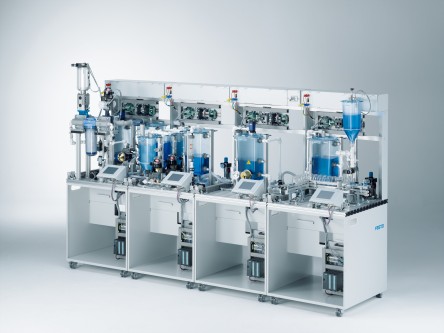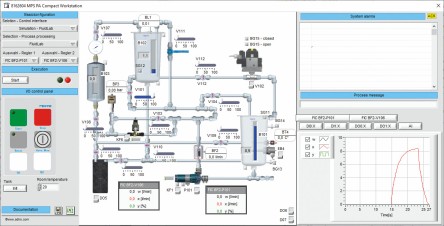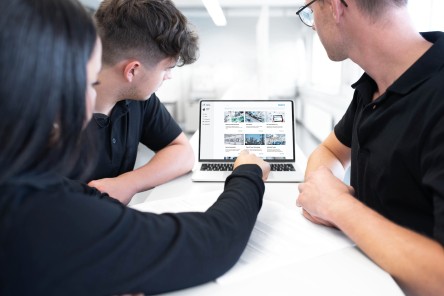
MPS- PA: Industry-oriented application in process automation
MPS®PA relies on industry standards. Automation solutions and trends from the market leaders characterize the concept of this product range. In the MPS®PA learning environment, educational offers can be designed for all levels of education: from general technology education to the training and further education of technicians and engineers. Each station represents a control route in its own right. However, if the variety of typical control systems is important, the stations are simply pushed together to form a small process engineering learning factory. With the new interface concept, there are countless possibilities to combine the stations with each other or, depending on the requirements, to expand them into a hybrid learning factory.

FluidLab-PA: The software simulation for PA Closed loop
With the EduKit PA, you benefit from industrial technology on the one hand, and methodical software support on the other: FluidLab-PA Closed loop guides the learner step by step, task by task into the world of measurement and control technology. What can be observed on the screen also takes place in the real system or in the simulation. FluidLab-PA Closed loop gives the learner the feeling of sitting in the control room and is therefore invaluable for motivation.
Further informationContinuous and Discreet: Cross-Border MPS PA
Each of the MPS PA stations represents a closed process that can be found in the same or similar form in many industries. Its control systems offer content for the design of demanding courses in measurement and control technology. They are representative of the most important continuous processes.
But all stations can also be combined with each other. With little investment, it is possible to take the step into the industrial reality of hybrid production. The interface concept opens up a wide range of possibilities for combining the individual MPS PA stations directly with each other. The decision for one or the other combination depends on various factors:
- Contents
- Existing equipment
- Your budget.
If you want to use all four stations in a network, you should order them as a complete MPS PA 204 system.
MPS PA 204 Complete System
This plant includes the 4 stations filtration – mixing – reactor – filling.
With P, PI or PID control algorithms, control technology is trained in a clear and practical way. The temperature sensor – a PT100 resistance thermometer is used at the reactor station – delivers a unit signal of 0 – 10 V via the transducer. The controller uses the constantly controllable heater to set the temperature setpoints and keeps them constant.
At a constant flow, the three starting materials are mixed into a recipe in the mixing station. The flow is measured by an electromagnetic flow sensor with a connected display and is additionally indicated by a variable area flow sensor. The regulator sets the required flow rate via the analogue-adjustable pump.
The pressure control system ensures consistently high filter quality in the filter station by means of backwashing. The pressure sensor with LCD display, analog output and switching output always delivers the correct measured variable. Via the proportional pressure control valve, the regulator ensures consistently high filter quality during backwashing.
In the filling station, the fill level of the dosing container is recorded with an analogue level sensor. Thanks to the pump, which can be controlled at all times, the control unit regulates the fill level to the respective tax value. During filling, the filling level of the dosing tank is kept constant, optimising the quality of filling.
Special learning content
- Construction, wiring and commissioning of a process plant
- Measurement of electrical and process parameters such as level, flow, pressure and temperature
- Construction and commissioning of control loops
- Evaluation of control behavior
- Networking of process plants
- Process operation and monitoring, plant management
- Selection, use and control of process valves
- Analysis of control systems and control loops
- Parameterization and optimization of P, PI or PID controllers
- Design of control and regulation programs
- Process operation and monitoring
- Inspection, maintenance and repair

A lot of learning content is included in Festo LX
For example
- MPS PA 204 Process Automation
Learning spaces for process technology
If you look at the trend topics of the process industry, we come across the following: Changeability of production plants, personalized products, fluctuating production volumes, maximum availability, progressive digitization of all business processes.
The Process Technology Room is designed to relieve the burden on teachers and encourage learners to learn and act independently. Many aspects of process technology are realistically mapped in hardware, software and teachware.
The learning system aims to map the commonalities of process technology as independently of the industry as possible. The measurement and control technology of levels, flows, pressures and temperatures almost always plays a role in monitoring a predetermined recipe of a manufacturing process.
1. Introduction to process and control technology The project kit is designed on a table-scale basis and is used to understand mechatronic plant construction and to learn the basics of measuring, controlling and regulating it.
2. Control systems of the process industry The learning system with different control systems teaches the filtering, mixing, temperature control and filling of liquids in a realistic process in 4 stations.
3. Multimedia/Creative Zone
4. Bulk solids technology With this learning system, the learners are taught the gentle and energy-efficient transport of bulk materials, their storage and their exact dosing.
5. Process control technology The operation and observation of process technology systems usually takes place in control rooms. Our learning systems, on the other hand, convey the functionality of process control systems with a high degree of transparency.
6. FluidLab-PA® Software-based teaching of the basics of control engineering. Different controllers can be parameterized with a click and measurement curves recorded.
7. Digitized business processes Using a bottle filling process with batch size 1, the apprentice is given an insight into the world of IoT.
8. Compact process technology The Compact workstation is well suited to teach learners how to measure, control and regulate in the smallest of spaces with different control systems.